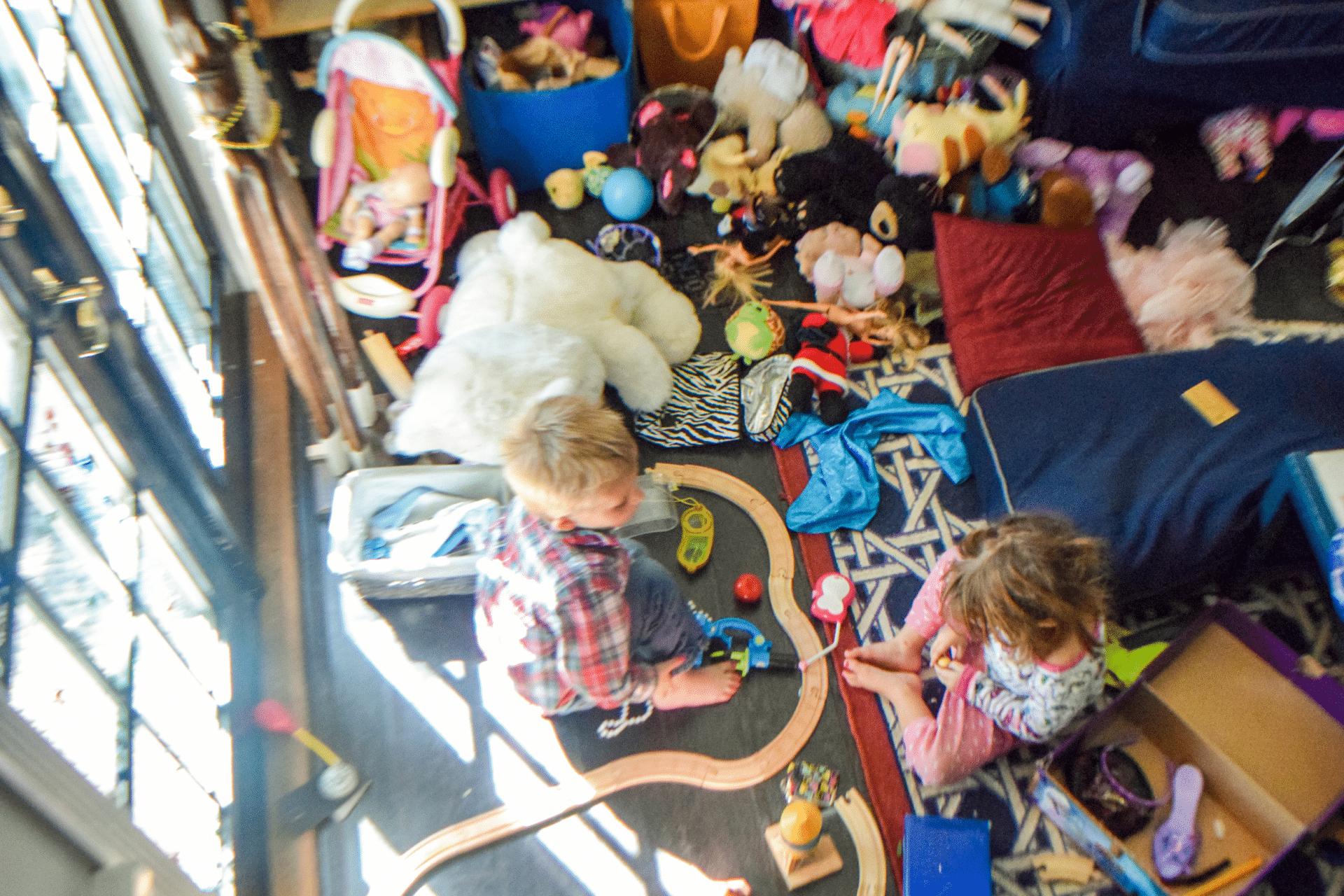Family Life
6 min Read
Is Your Kid A Hoarder? Tips For Helping Them Let Go

February 24, 2021
Family Life
6 min Read

February 24, 2021

I must confess. Lurking in the back of my garage, amongst boxes of books from my daughters’ childhood, is a clear plastic bag in which a large stuffed monkey and big bear hibernate. Every year, as I clear out my garage, I pause momentarily as I consider letting go of them.
When I was 15, my family and I emigrated from South Africa to Canada and as you might imagine, were not able to bring all of our possessions with us. In the process of packing, I imagine that my mother might have thrown out some items that were sentimentally valuable to me. I’m thinking this because I don’t recall being too involved with the packing and can’t imagine ever throwing out the round purple cushion I knitted in home economics class, for example. The one that my first boyfriend cuddled when he was over, leaving only the scent of his Brut cologne behind.
So, it’s no wonder that I have always been particularly vigilant about checking with my daughters before throwing anything of theirs away in case it means something more significant to them than I might think.
Having said this, I realize and help others recognize the importance of clearing clutter, living in the present and not hoarding just in case. I also recognize the importance of learning to let go.
When children are younger, even items that appear insignificant to us, can mean the world to them. A stick he finds in the park, the outer shell of a snail she finds in your backyard, the old sweater he’s outgrown but refuses to part with. Items such as this, despite being material objects, become associated with other significant memories such as spending time in the park with you, going on scavenger hunts in your backyard or the warmth he felt in your embrace while wearing the sweater.
Many children also like to create collections. A different shape or sized rock wherever she goes begin to fill a large shoe box, favourite character figurines from the latest Disney movie become her coveted possession over time. Collections are significant because they may represent feelings of accomplishment as she watches her collection grow, may be symbolic of wanting to hold onto fond memories from the past and are great ways to help with organizational and analytical skills.
Parents will often ask their children to get rid of the dusty collection, or a random item such as a stick from the park, before their children are ready to part with it. And when they don’t, you might consider just tossing it in the garbage when she isn’t looking or hiding it away for a while until you can safely guess that it has been forgotten about. My suggestion is not to do this.
Learning to let go is a life-long process. It begins with saying goodbye to a decaying piece of wood or pile of wrapping papers and continues through to being able to say goodbye to a parent who has died, for example. So, helping one’s child let go, while important, should not be rushed or imposed.
My advice is to take one small step at a time and to offer strategies along the way. So, for example, as you go about helping your child organize his room, or tidy his drawers, you may suggest putting aside a pile of items he no longer uses or wants and then helping him figure out what to do with them—maybe donating them to charity, for example.
Be considerate and respectful of his feelings if he’s not ready to let go of something quite yet. Help him to evaluate the significance of random or worn-out objects. Authors have written books on how to declutter and some recommend holding an object in one’s hand and tuning into one’s bodily reaction while asking, “Does this object bring me joy?” for example. If yes, then put it back where it came from or find a different resting spot.
Another suggestion might be to put items that your child recognizes as no longer useful or of value, but is not quite ready to let go of, in a box with the date on it. Offer the suggestion to keep the box for a period of time, after which time to let go of – without looking inside.
My guess is that your child will one day be ready to let go of most of the objects that are no longer useful or are just collecting dust.
Rushing that process may actually cause him to hold on to objects longer than he might otherwise have.
And yes, I do believe that one day, like so many thousands of other objects and all the significant people I have let go of, I will be able to say goodbye to my two stuffed animals in the large plastic bag in my garage.
Watch as your child finds wonder in the smallest of objects in her environment and then wants to keep them close. Wanting to take a little piece of that experience home is not unusual for preschoolers. At this age, an object that is like gold one day, but may be forgotten about the next. Either left behind without a second thought or mourned over for a few minutes, preschoolers are very good at living in the moment but then easily move onto the next treasure.
School-aged children are more inclined to create collections and have a harder time saying goodbye. Since they are learning all about sorting and classifying objects into groups at school, collections can help with this. In addition, there’s the thrill of the hunt as the child discovers another item to add to his collection and there’s the social aspect of maybe even trading items with a friend who has a similar collection. So, holding onto material objects at this age is quite common and forcing a child to part with it or them should be dealt with sensitively.
Teens are a mixed bag. Some are very casual when it comes to giving their material items away while others hold onto a torn pair of jeans because it reminds them of a special occasion. Some appear to never know where their possessions are, while others have a difficult time sharing with others. Some of this has to do with their individual temperament, with the way in which letting go of an object was handled in earlier years and also by the kind of modelling they’ve seen from the adults in their world.
Sara Dimerman is a psychologist, author and parenting expert in the Greater Toronto Area. Read more at helpmesara.com.
Originally published in ParentsCanada magazine, Summer 2017.